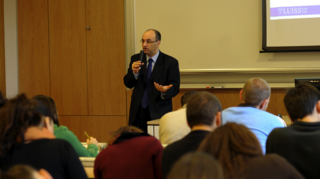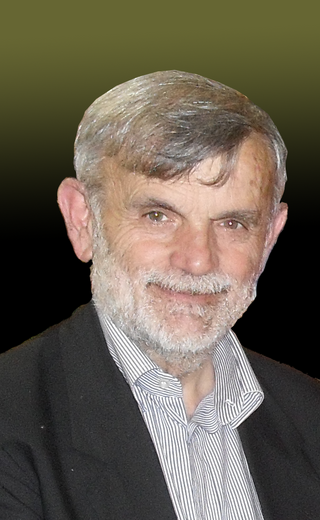Social science is one of the branches of science, devoted to the study of societies and the relationships among individuals within those societies. The term was formerly used to refer to the field of sociology, the original "science of society", established in the 18th century. In addition to sociology, it now encompasses a wide array of academic disciplines, including anthropology, archaeology, economics, geography, linguistics, management, communication studies, psychology, culturology and political science.

The following outline is provided as an overview of and topical guide to the discipline of sociology:

Anthony Giddens, Baron Giddens is an English sociologist who is known for his theory of structuration and his holistic view of modern societies. He is considered to be one of the most prominent modern sociologists and is the author of at least 34 books, published in at least 29 languages, issuing on average more than one book every year. In 2007, Giddens was listed as the fifth most-referenced author of books in the humanities. He has academic appointments in approximately twenty different universities throughout the world and has received numerous honorary degrees.

Constructivism is a view in the philosophy of science that maintains that scientific knowledge is constructed by the scientific community, which seeks to measure and construct models of the natural world. According to constructivists, natural science consists of mental constructs that aim to explain sensory experiences and measurements, and that there is no single valid methodology in science but rather a diversity of useful methods. They also hold that the world is independent of human minds, but knowledge of the world is always a human and social construction. Constructivism opposes the philosophy of objectivism, embracing the belief that human beings can come to know the truth about the natural world not mediated by scientific approximations with different degrees of validity and accuracy.
The theory of structuration is a social theory of the creation and reproduction of social systems that is based on the analysis of both structure and agents, without giving primacy to either. Furthermore, in structuration theory, neither micro- nor macro-focused analysis alone is sufficient. The theory was proposed by sociologist Anthony Giddens, most significantly in The Constitution of Society, which examines phenomenology, hermeneutics, and social practices at the inseparable intersection of structures and agents. Its proponents have adopted and expanded this balanced position. Though the theory has received much criticism, it remains a pillar of contemporary sociological theory.
In the social sciences there is a standing debate over the primacy of structure or agency in shaping human behaviour. Structure is the recurrent patterned arrangements which influence or limit the choices and opportunities available. Agency is the capacity of individuals to act independently and to make their own free choices. The structure versus agency debate may be understood as an issue of socialization against autonomy in determining whether an individual acts as a free agent or in a manner dictated by social structure.

This is an index of sociology articles. For a shorter list, see List of basic sociology topics.
The concept of reflexive modernization or reflexive modernity was launched by a joint effort of three of the leading European sociologists: Anthony Giddens, Ulrich Beck and Scott Lash. The introduction of this concept served a double purpose: to reassess sociology as a science of the present, and to provide a counterbalance to the postmodernist paradigm offering a re-constructive view alongside deconstruction.

Margaret Scotford Archer was an English sociologist, who spent most of her academic career at the University of Warwick where she was for many years Professor of Sociology. She was also a professor at l'Ecole Polytechnique Fédérale de Lausanne, Switzerland. She is best known for coining the term elisionism in her 1995 book Realist Social Theory: The Morphogenetic Approach. On 14 April 2014, Archer was named by Pope Francis to succeed former Harvard law professor and US Ambassador to the Holy See Mary Ann Glendon as President of the Pontifical Academy of Social Sciences, and served in this position until her retirement on 27 March 2019.
Reflectivism is an umbrella label used in International Relations theory for a range of theoretical approaches which oppose rational-choice accounts of social phenomena and positivism generally. The label was popularised by Robert Keohane in his presidential address to the International Studies Association in 1988. The address was entitled "International Institutions: Two Approaches", and contrasted two broad approaches to the study of international institutions. One was "rationalism", the other what Keohane referred to as "reflectivism". Rationalists — including realists, neo-realists, liberals, neo-liberals, and scholars using game-theoretic or expected-utility models — are theorists who adopt the broad theoretical and ontological commitments of rational-choice theory.
In epistemology, and more specifically, the sociology of knowledge, reflexivity refers to circular relationships between cause and effect, especially as embedded in human belief structures. A reflexive relationship is multi-directional when the causes and the effects affect the reflexive agent in a layered or complex sociological relationship. The complexity of this relationship can be furthered when epistemology includes religion.
Scott Lash is a professor of sociology and cultural studies at Goldsmiths, University of London. Lash obtained a BSc in Psychology from the University of Michigan, an MA in Sociology from Northwestern University, and a PhD from the London School of Economics (1980). Lash began his teaching career as a lecturer at Lancaster University and became a professor in 1993. He moved to London in 1998 to take up his present post as Director for the Centre for Cultural Studies and Professor of Sociology at Goldsmiths College.

Michele Sorice is an Italian sociologist and political scientist known for his work in the fields of political communication, political science and critical media studies. He is the author of over 25 books and 50 articles.

Roberto Cipriani is an Italian social scientist. He is professor emeritus of sociology at Roma Tre University. "He has written extensively on popular religion, the sacred and secularization", and is known for his unconventional applications of the "concept of 'diffused religion' and then that of 'religion of values' ". He has made analytical contributions to the concept of diffused religion by using grounded theory. "He also underlines what he calls the 'meta-institutional' character of this religion, even if, he says, these characteristics have a religious institutional origin".

Luigi Berzano is an Italian sociologist and Catholic priest.
Vittorio Cotesta - Roccagorga (LT) is an Italian social scientist. At present he is conducting research into global society, cosmopolitism and human rights, sociological theories, cultures, civilizations and ethnic conflict.

Critical realism is a philosophical approach to understanding science, and in particular social science, initially developed by Roy Bhaskar (1944–2014). It specifically opposes forms of empiricism and positivism by viewing science as concerned with identifying causal mechanisms. In the last decades of the twentieth century it also stood against various forms of postmodernism and poststructuralism by insisting on the reality of objective existence. In contrast to positivism's methodological foundation, and poststructuralism's epistemological foundation, critical realism insists that (social) science should be built from an explicit ontology. Critical realism is one of a range of types of philosophical realism, as well as forms of realism advocated within social science such as analytic realism and subtle realism.

Relational sociology is a collection of sociological theories that emphasize relationalism over substantivalism in explanations and interpretations of social phenomena and is most directly connected to the work of Harrison White and Charles Tilly in the United States and Pierpaolo Donati and Nick Crossley in Europe.
The materiality turn in organization studies is the theoretical movement emphasizing objects, instruments and embodiments involved in organizations and organizing and the ontologies underpinnings theories about organizations and organizing, what deeply 'matters' in the study of organizations and organizing.

Domenico De Masi was an Italian sociologist. He was professor emeritus of sociology of work at the Università degli Studi di Roma "La Sapienza", where he also was head of the Faculty of Communication Sciences.








